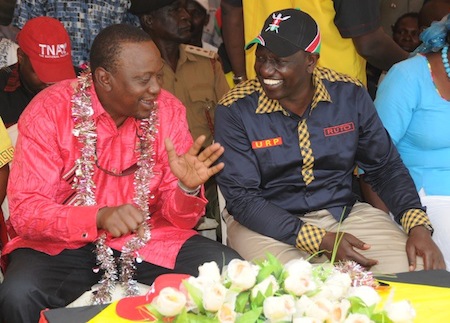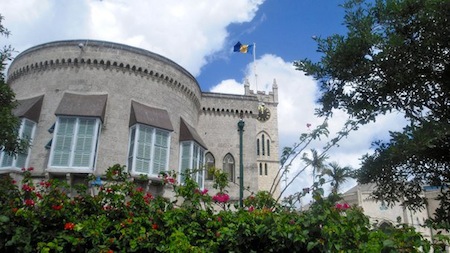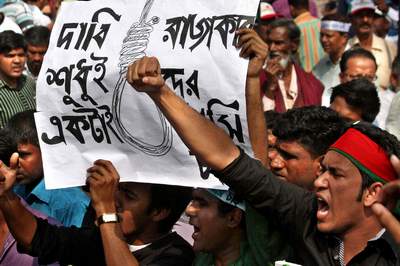
Friday’s ruling from the Kenyan High Court has — for now, at least, and through the duration of the presidential campaign, barring any last-minute intervention from Kenya’s supreme court — cleared the legal obstacles for Uhuru Kenyatta to run for president in the March 4 election.
Kenyatta’s legal issues stem from Kenyatta’s indictment for crimes against humanity by the International Criminal Court, on the basis of orchestrating ethnic violence following the previous presidential election in 2007 when over 1,000 Kenyans were killed during tumult that upturned hundreds of thousands more from their homes, pummeled the reputation Kenya’s political system and damaged its economy.
Kenyatta’s running mate, William Ruto (pictured above right, with Kenyatta at left), is one of five other Kenyan officials also charged for crimes against humanity, and the High Court’s ruling also clears him. Kenyatta and Ruto were actually on opposite political sides in 2007, though they’ve now found common cause through, among other things, the pariah status that’s come from ICC indictment.
It’s more accurate, however, to say that the court refused to intervene — the basis of the case was whether Kenyatta and Ruto had demonstrated sufficient ‘personal integrity, competence and suitability’ for the presidency, as stated under Kenya’s constitution. The court claimed it lacked the jurisdiction to disqualify the candidates, though it noted that the Supreme Court holds jurisdiction to make such a determination.
Kenyatta and Ruto head the Jubilee alliance, a merger of various parties, but really an alliance that binds together members from Kenyatta’s Kikuyu ethnic group (Kenya’s largest, comprising around 22% of the population) and Ruto’s Kalenjin ethnic group.
Kenyatta’s main opponent, Raila Odinga, heads the CORD (Coalition for Reforms and Democracy) alliance, which binds together Odinga’s Luo ethnic group and the Kamba ethnic group of Odinga’s running mate, Kalonzo Musyoka.
Kenyatta, currently a deputy prime minister since 2008 and minister of finance from 2008 to 2012 under Kenya’s outgoing, term-limited president Mwai Kibaki, is the son of Kenya’s first president, Jomo Kenyatta.
Odinga, currently Kenya’s prime minister following the power-sharing agreement that resulted in the wake of the 2007 presidential election, is the son of Kenya’s first vice president, Jaramogi Oginga Odinga, whose falling out with Jomo Kenyatta in the 1960s serves as prologue to much of this year’s presidential election. In 2007, Odinga only narrowly lost the presidency to Kibaki, and he’s held a narrow lead throughout much of the 2013 campaign, though Kenyatta has waged a spirited campaign and was generally seen as the winner of Kenya’s first presidential debate on February 11.
Within Kenya, the ICC charges themselves matter little to voters — though Odinga is more to the left and Kenyatta is more to the right, Kenya’s election has been polarized into tribal ethnic lines, not on standard ideological lines. So Kenyatta’s supporters could care less about international charges they believe are unfair, though Odinga has used the ICC charges to taunt Kenyatta, most recently during their presidential debate when Odinga scoffed that it would be impractical to run a government from the Hague using Skype.
Even Odinga, nonetheless, has called for the Kenyan courts to validate Kenyatta’s presidential candidacy, and he’s even called for any trials over the 2007-08 violence to be settled in Nairobi, not through the ICC.
In a sense, while the ICC charges themselves are a fringe issue, they are also at the heart of the campaign, given the ethnic tensions involved in the current campaign and the desire among all of Kenya’s leaders to avoid a devastating replay of the 2007 and 2008 political violence that followed the last election.
Continue reading Kenyatta, Ruto cleared to run in Kenyan election despite ICC woes →
![]()



